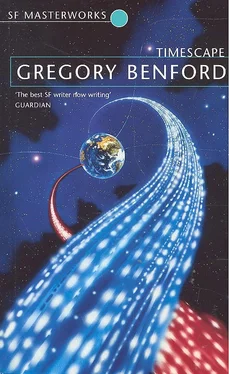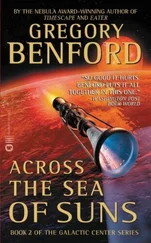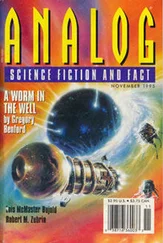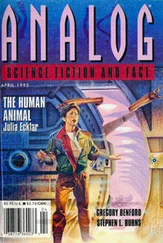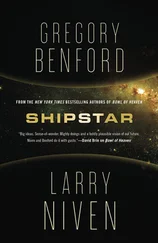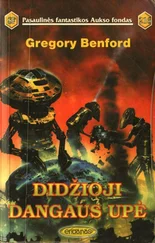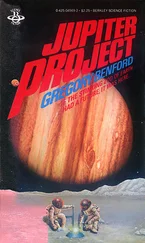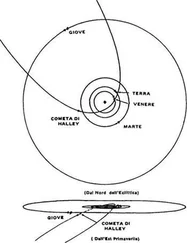He drove a winding route along the narrow back streets near the ocean. Tiny houses, almost doll-sized, crowded each other. Many were gingerbreaded or sported needless cupolas. Curls and latticework elbowed a neighbor’s elephant-eared begonias. Roses rubbed stands of lush bamboo. Filaments of every architectural style seemed to have splashed over the houses and clung, dripping. The streets were straight and silent, regimenting the babble of cultures and pasts that had washed up on this vest pocket village. La Jolla was a place where everything came together in a way unlike New York, with an odd and waiting energy. Gordon liked it. He took a swing around to 6005 Camino de la Costa on an impulse. It was a minor shrine now, the place where Raymond Chandler lived and worked in the ’40s and ’50s, with a flag-stoned courtyard and a jumbled rock garden that spread up the hill behind it. He had read every Chandler novel, immediately after seeing Bogart in The Big Sleep for the first time; Penny had said it was one way of finding out what California was about.
He bought food at Albertson’s and a case of various white wines at a liquor store near Wall Street, The parquet floors of the store hoarded the slackening dry heat of the day. A burly, tanned man eyed Gordon’s button-down shirt with a distant amusement as he sacked the bottles. Coming out of the store, Gordon saw Lakin getting out of an Austin-Healey down the street. He turned away quickly and walked down Prospect; in the dim twilight Lakin had probably missed seeing him. The paper on spontaneous resonance had sailed through ‘Physical Review Letters with ease, as Lakin predicted. The entire incident now seemed closed to Lakin, but Gordon still felt the unease of a man who is passing checks but knows his account is overdrawn. He put the bottles, clanking together, in the trunk of the Chevy, and then walked by the Valencia Hotel. There were no gaudy electrical apparitions yelling out their advertisements in La Jolla, no factories, pool halls, smokestacks, graveyards, railroad stations, or cheap diners to besmirch the ambience. The Valencia announced itself with a modestly lettered sign. On the veranda two middle-aged women were playing canasta and chattering with zest. They wore elaborate print dresses bunched at the waist, heavy metallic necklaces, and their hands sported at least three rings apiece. The two men playing with them looked older and tired. Probably worn out from signing checks , Gordon thought, and walked past them into the lobby. The hotel bar gave off a buzz of conversation. He made his way along ranks of rattan couches to the rear sitting room of the lobby; he liked to look down from here at the cove below. Ellen Browning Scripps had seen what the Land-gobblers were doing to the town and set aside a smooth green lawn around the cove, so that somebody beside the rich could watch the lazy swells roll in. As Gordon watched, the floodlights came on, making the white walls of churning water leap out of the sea’s darkness, chewing the land. Gordon’s few expeditions into the Pacific had been launched from the half-moon beaches below. Offshore there was a rock where you could stand and rise out of the lapping troughs of waves. It was slippery footing, but he liked to look back at the land, crusted with impermanent stucco and wood and whitewash, as though at this remove he could judge it, get a firm perspective. Chandler had said it was a town full of old people and their parents, but somehow he had never mentioned the sea and the remorseless, roaring breakers that punctuated the long rambling sentences of waves, always gnawing at the shore. It was as though some unnoticed force came over the horizon, all the way from Asia, and chipped away at this cozy pocket of Americana. Stubby breakwaters tried to blunt the effect, but Gordon could not understand how they could last. Time would eat all this away; it had to.
When he went back through the lobby, the bar’s murmur was about one drink louder than before. A blond gave him a look of appraisal and then, realizing he was no prospect, her face turned soft as sidewalk and she looked back down at her copy of Life . He stopped by the tobacco shop on Girard and bought a paperback for 35¢, fanning the pages to his nose as he left; they always carried the sweet humus smell of a pipe pouch.
He opened the door of their bungalow with his key. A man sat on the couch pouring some bourbon into a water glass.
“Oh, Gordon,” Penny said, her voice lilting as she got up from her seat next to the stranger. “This is Clifford Brock.”
The man rose. He was wearing khaki slacks and a brown wool shirt with pockets that buttoned. His feet were bare and Gordon could see a pair of zori lying beside the duffel bag by the couch. Clifford Brock was tall and chunky, with a slow grin that crinkled his eyes as he said, “Glad t’meet ya. Nice place you got here.”
Gordon murmured a greeting. “Cliff is an old high school buddy of mine,” Penny said merrily. “He’s the one took me to Stockton, that time for the races.”
“Oh,” Gordon said, as though this explained a great deal.
“Like some Old Granddad?” Cliff offered the open bottle on the coffee table, still giving off his fixed grin.
“No, no thanks. I just went out to buy some wine.”
“I got some, too,” Cliff said. He fished a gallon jug from under the coffee table.
“I went out with him to get some stuff to drink,” Penny volunteered. Her forehead was lightly beaded with perspiration. Gordon looked at the gallon jug. It was a Brookside red, wine they usually used for cooking.
“Wait’ll I bring in the rest from the car,” he said to sidestep Cliff’s proffered jug. He went out into the cooling evening and brought in the other bottles, storing some in a cabinet and the rest in the refrigerator. He corkscrewed one open, even though it wasn’t chilled, and poured himself a glass. In the living room Penny busied herself setting out Fritos and a bean dip and listening to Cliff’s slow drawl.
“You stayed late at the Lakin party?” Penny asked, as Gordon settled into their Boston rocker.
“No, I just stopped off to buy some things. Wine. The party was just another back-slapping thing.” The image of Roger Isaacs or Herb York slapping a venerated philosopher on the back, like Shriners on a binge, didn’t really fit, but Gordon let it go.
“Who was it?” Penny said, showing dutiful interest. “Who were they recruiting?”
“A Marxist critic, somebody said. He mumbled a lot and I couldn’t make out much of it. Something about capitalism repressing us and not letting us unleash our true creative energies.”
“Universities are great for hiring Reds,” Cliff said, blinking owlishly.
“I think he’s more of a theoretical communist,” Gordon temporized, not really wanting to defend the point.
“Do you think you’ll hire him?” Penny asked, obviously steering the conversation.
“I don’t have any say. That’s the Humanities people. Everybody was being very respectful, except for Feher. This guy was saying that under capitalism, man exploits man. Feher poked a finger at him and said, yeah, and under communism, it’s vice versa. That got a good laugh. Popkin didn’t like it, though.”
“Don’t need Reds to teach you anything you can’t learn in Laos,” Cliff said.
“What did he say about Cuba?” Penny persisted.
“The missile crisis? Nothing.”
“Hum.” Penny said triumphantly. “What’s he written, this guy, anyway?”
“There was a little stack of his publications. One-Dimensional Man one of them was, and—”
“Marcuse. That was Marcuse,” Penny said flatly.
“Who’s he?” Cliff murmured, pouring himself some Brookside into another glass.
Читать дальше
